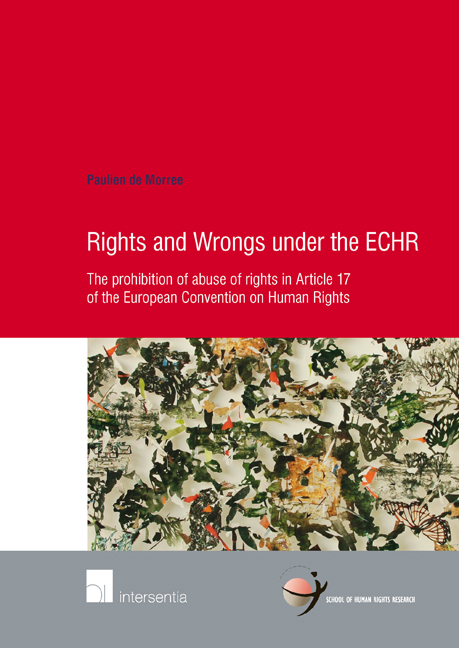 Rights and Wrongs under the ECHR
Rights and Wrongs under the ECHR Book contents
- Frontmatter
- Acknowledgements
- Contents
- List of Abbreviations
- Chapter 1 Introduction
- Chapter 2 The Creation of the European Convention on Human Rights
- Chapter 3 The Strasbourg Case Law on Article 17 ECHR
- Chapter 4 The Interpretation of Article 17 Echr in Legal Doctrine
- Chapter 5 Other Abuse Clauses in Human Rights Law
- Chapter 6 The Concept of Abuse of Rights
- Chapter 7 The Concept of Militant Democracy
- Chapter 8 The German ‘Wehrhafte Demokratie’
- Chapter 9 Militant Democracy in the Context of the ECHR
- Chapter 10 Conclusions
- Bibliography
- Table of Cases
- Samenvatting
- Curriculum Vitae
- School of Human Rights Research Series
Chapter 5 - Other Abuse Clauses in Human Rights Law
Published online by Cambridge University Press: 12 December 2017
- Frontmatter
- Acknowledgements
- Contents
- List of Abbreviations
- Chapter 1 Introduction
- Chapter 2 The Creation of the European Convention on Human Rights
- Chapter 3 The Strasbourg Case Law on Article 17 ECHR
- Chapter 4 The Interpretation of Article 17 Echr in Legal Doctrine
- Chapter 5 Other Abuse Clauses in Human Rights Law
- Chapter 6 The Concept of Abuse of Rights
- Chapter 7 The Concept of Militant Democracy
- Chapter 8 The German ‘Wehrhafte Demokratie’
- Chapter 9 Militant Democracy in the Context of the ECHR
- Chapter 10 Conclusions
- Bibliography
- Table of Cases
- Samenvatting
- Curriculum Vitae
- School of Human Rights Research Series
Summary
INTRODUCTION
The previous chapters focussed on the origin and interpretation of the abuse clause in Article 17 ECHR. We have learned that it is an ambiguous provision and that neither case law nor legal doctrine provides a uniform interpretation. The prohibition of abusing rights is not unique to the ECHR. Several international human rights documents of universal or regional application also contain an abuse of rights clause. Equivalent provisions to Article 17 ECHR are found in the Universal Declaration of Human Rights (1948), the International Covenant on Civil and Political Rights (1966), the International Covenant on Economic, Social and Cultural Rights (1966), the American Convention on Human Rights (1969), and the Charter of Fundamental Rights of the European Union (2000). In this chapter we will explore the interpretation of these other abuse clauses.
In this chapter the interpretation of the abuse clauses in these other human rights documents will be analysed. Even though all these abuse clauses are similar in wording, these documents vary in their scope and focus (universal or regional and general or specific groups of rights). The purpose of this chapter is to explore to what extent these other abuse clauses provide interesting insights that may contribute to a better understanding of Article 17 ECHR. It will therefore not provide an indepth study of these human rights documents in general, but will merely focus on the background and interpretation of the abuse clauses in these documents.
THE UNIVERSAL DECLARATION OF HUMAN RIGHTS
In October 1945 the UN was established by the entry into force of the Charter of the United Nations. Motivated by the tragic experience of the Second World War and the atrocious human rights violations committed in the Holocaust, the promotion and protection of human rights is one of the core purposes of the UN. In the UN Charter the protection of human rights is mentioned in three major provisions: Articles 1(3), 55(c), and 56. These provisions impose, in broad terms, an obligation on the Member States of the UN to ‘promote… universal respect for, and the observance of, human rights’ and to take ‘joint and separate action in co-operation with the Organization’ to achieve that purpose.
- Type
- Chapter
- Information
- Rights and Wrongs under the ECHRThe prohibition of abuse of rights in Article 17 of the European Convention on Human Rights, pp. 99 - 120Publisher: IntersentiaPrint publication year: 2016
